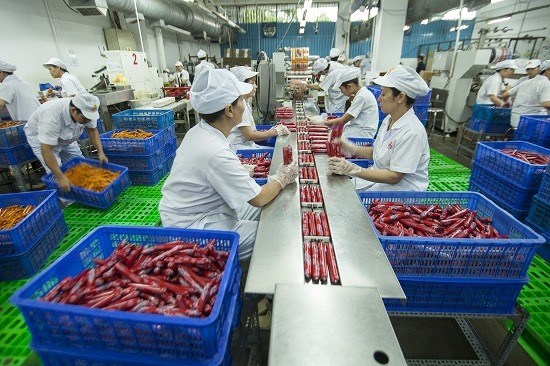
The food processing and drinks industry has seen growth of 7 percent in recent years, with more and more foreign investors deciding to pour money into the sector.
In HCM City, food and drinks represented 17 percent of total retail revenue last year. (Photo: baotintuc.vn).
"The food and
drinks sector is now taking the largest proportion of monthly spending for the
Vietnamese, around 35 percent,” Pham Thanh Kien, Director of the Ho Chi Minh
City Industry and Trade Department, was quoted as saying in theSai Gon
Giai Phong(Liberated Sai Gon) newspaper.
In HCM City, food and drinks represented 17 percent of total
retail revenue last year.
Export turnover for food processing and agricultural products
totalled more than 40 billion USD last year.
Vietnamese products have successfully reached many technical
standards and quality barriers and are present in 200 countries, including the
US, Japan, the Republic of Korea and the EU.
For foreign investors, the abundance of agricultural products
and foodstuff in the country is an advantage. Vietnam is considered one of the
top five food baskets in the world and one of the top 15 largest countries by
agriculture exports.
The young population and the rising popularity of processed
food are two other factors influencing investors’ decisions.
For the last five years, many international food-processing
companies have and expanded their production in Vietnam.
In the coming time, the Government plans to withdraw
its shares in major food processing and drink companies like Vinamilk or Habeco
and create more opportunities for foreign investors.
Foreign investors have also invested in and expanded their
trade centres, supermarkets and convenience stores, which have all helped to
increase consumption of processed foods.
Multinational retailers like Circle K, 7-Eleven, B’s mart,
Family Mart, MiniStop, Big C, Aeon and Lotte now have a total of 3,000
convenience stores, 300 trade centres and supermarkets in Vietnam.
"This also means more competitive pressure for the domestic
food processing and drink manufacturers,” said Ly Kim Chi, Chairwoman of the
HCM City Food and Foodstuff Association.
Currently, 98 percent of domestic manufacturers are small and
medium size with limited financial resources and poor competitiveness.
"Foreign distributors and manufacturers have a strategy to
dominate the Vietnamese market. Distributors have reduced expenditures to the
producers, while the latter have dropped selling prices or increased
promotions,” she said.
"Foreign distributors have also established barriers like
quality and packaging standards and many others so they can refuse domestic
products,” she added.
"To compete on the home ground, domestic enterprises must
increase their production capability, quality and packaging to meet
international standards,” said Huynh Thanh Dien from HCM City’s University of
Economics.
"For long-term development, domestic enterprises should join
international supply chains. Authorities should also apply the same incentive
policies for foreign and domestic companies,” he added.
Many foreign companies receive preferential treatment on land
rent, taxes and technology imports.
"Authorities should also prevent unhealthy competition when
foreign enterprises work together to try to eliminate local ones and engage in
dumping practices,” he said.
Vietnam has 5,500 food and drink manufacturing enterprises,
with 2,000 of them located in HCM City.-
Source: VNA
According to data from the Hoa Binh Provincial Party Committee, the industrial production index for the first six months of 2025 is estimated to have increased by 20% compared to the same period last year. This marks the highest year-on-year growth rate for this period since 2020.
In the first six months of 2025, Hoa Binh province’s export turnover was estimated at 1.145 billion USD, marking an 18.11% increase compared to the same period in 2024. Import turnover was estimated at $ 804 million, a 17.15% increase, which helped the province maintain a positive trade balance.
The lives of the ethnic minority farmers in Tan Lac district have gradually improved thanks to the new directions in agricultural production. This is a testament to the collective strength fostered through the professional associations and groups implemented by various levels of the district’s Farmers’ Union.
With the motto the "product quality comes first,” after nearly one year of establishment and operation, Muong village’s Clean Food Agricultural and Commercial Cooperative, located in Cau Hamlet, Hung Son Commune (Kim Boi district), has launched reputable, high-quality agricultural products to the market that are well-received by consumers. The products such as Muong village’s pork sausage, salt-cured chicken, and salt-cured pork hocks have gradually carved out a place in the market and they are on the path to obtaining the OCOP certification.
In the past, the phrase "bumper harvest, rock-bottom prices" was a familiar refrain for Vietnamese farmers engaged in fragmented, small-scale agriculture. But today, a new spirit is emerging across rural areas of Hoa Binh province - one of collaboration, organisation, and collective economic models that provide a stable foundation for production.
Maintaining growing area codes and packing facility codes in accordance with regulations is a mandatory requirement for agricultural products to be eligible for export. Recently, the Department of Agriculture and Environment of Hoa Binh province has intensified technical supervision of designated farming areas and packing facilities to safeguard the "green passport" that enables its products to access international markets.


